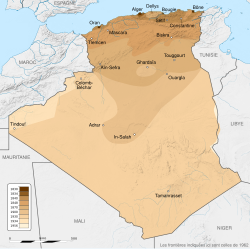
Back Processus d'occupation coloniale de l'Algérie (1830-1902) French Zaman lafiya na Aljeriya Hausa Pacificazione dell'Algeria Italian Геноцид алжирцев Russian
| Pacification of Algeria | |
|---|---|
| Part of the French conquest of Algeria | |
 Chronological map of the French conquest | |
| Location | French Algeria |
| Date | 1830–1875 |
| Target | Muslim Algerians |
Attack type | Genocide, ethnic cleansing, forced displacement, chemical warfare, scorched earth |
| Deaths | 500,000–1,000,000[1] |
| Perpetrator | French colonial empire |
| Motive | French nationalism, imperialism, settler colonialism, Islamophobia, anti-Arab racism, Kabyle myth[1] |
The pacification of Algeria, also known as the Algerian genocide,[2][3][4] refers to violent military operations between 1830 and 1875 during the French conquest of Algeria, that often involved ethnic cleansing, massacres and forced displacement, aimed at repressing various tribal rebellions by the native Algerian population. Between 500,000 and 1 million Algerians were killed, out of an estimated population of 3 million.[1][5] During this period, France formally annexed Algeria in 1834, and approximately 1 million European settlers moved to the Algerian colony.[6] Various scholars consider France's actions in Algeria as genocidal or constituting a genocide.[1][4][7]
- ^ a b c d Kiernan, Ben (2007). Blood and Soil: A World History of Genocide and Extermination from Sparta to Darfur. Yale University Press. pp. 364–374. ISBN 978-0300100983.
In Algeria, colonization and genocidal massacres proceeded in tandem. From 1830 and 1847, its European settler population quadrupled to 104,000. Of the native Algerian population of approximately 3 million in 1830, about 500,000 to 1 million people perished in the first three decades of French conquest.
- ^ Gallois, William (2013), Gallois, William (ed.), "An Algerian Genocide?", A History of Violence in the Early Algerian Colony, London: Palgrave Macmillan, pp. 145–171, doi:10.1057/9781137313706_7, ISBN 978-1-137-31370-6, retrieved 2024-09-17
- ^ Gallois, William (20 February 2013). "Genocide in nineteenth-century Algeria". Journal of Genocide Research. 15 (1): 69–88. doi:10.1080/14623528.2012.759395. ISSN 1462-3528.
- ^ a b Schaller, Dominik J. (2010). "Genocide and Mass Violence in the 'Heart of Darkness': Africa in the Colonial Period". In Bloxham, Donald; Moses, A. Dirk (eds.). The Oxford Handbook of Genocide Studies. Oxford University Press. p. 356. ISBN 978-0-19-923211-6.
The French conquest of Algeria in the 1830s and 1840s reached genocidal dimensions when Arab tribes under Abd al-Qadir launched successful attacks against the invaders. Even Alexis de Tocqueville, who later became an ardent critic of French exterminationist policies in Algeria, had been in favour of radical means to defeat Abd al-Qadir
- ^ Jalata, Asafa (2016). Phases of Terrorism in the Age of Globalization: From Christopher Columbus to Osama bin Laden. Palgrave Macmillan US. pp. 92–93. ISBN 978-1-137-55234-1.
- ^ "Opinion | France must reckon with its dark history in Algeria. It's not too late". The Washington Post. 2020-01-29. ISSN 0190-8286. Retrieved 2024-09-17.
- ^ Gallois, William (2023). "The Genocidal French Conquest of Algeria, 1830–1847". In Blackhawk, Ned; Kiernan, Ben; Madley, Benjamin; Taylor, Rebe (eds.). The Cambridge World History of Genocide. Vol. II: Genocide in the Indigenous, Early Modern and Imperial Worlds, from c.1535 to World War One. Cambridge University Press. p. 363. doi:10.1017/9781108765480.016. ISBN 978-1-108-76548-0.
Taking, for instance, the 1948 UN Convention on the Prevention and Punishment of the Crime of Genocide, the Algerian case would certainly seem to meet its bar in terms of the availability of evidence that the French committed acts 'with intent to destroy, in whole or in part, a national, ethnical, racial or religious group'.